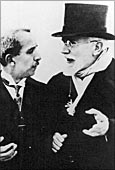| The Greek-Turkish understanding

 Towards the late 1920s, and after Eleftherios Venizelos had taken over power, the process of rapprochement between Greece and Turkey began. The contribution of the Greek prime minister had been decisive in the complex and delicate issue of the settlement of relations between the two countries. Having ensured Italian support, Venizelos exchanged a number of letters with his Turkish counterpart, Ismet, seeking the settlement of current problems and aiming at more constructive contact in the future. The Turkish side initially responded positively. However, as expected, this coming together met with many obstacles, chief among them being reparations to non-exchangeable populations.
Towards the late 1920s, and after Eleftherios Venizelos had taken over power, the process of rapprochement between Greece and Turkey began. The contribution of the Greek prime minister had been decisive in the complex and delicate issue of the settlement of relations between the two countries. Having ensured Italian support, Venizelos exchanged a number of letters with his Turkish counterpart, Ismet, seeking the settlement of current problems and aiming at more constructive contact in the future. The Turkish side initially responded positively. However, as expected, this coming together met with many obstacles, chief among them being reparations to non-exchangeable populations.
The Greek government, wishing to promote the idea of peaceful co-existence and co-operation, consciously sacrificed part of its claims (money debts etc.) in order to obtain more general benefits. A basic principle in these estimations was the need to safeguard the position and the rights of the Greek minority that had remained mainly in Constantinople. Secondly, it was in line with the wider policy practised by Venizelos in the four-year period 1928-32, the spearhead of which was mainly domestic reconstruction and ensuring vested rights. The contacts between Greece and Turkey were sealed by the conclusion of relevant agreements (1930 and 1933).
The reactions of the Greek populace were, as expected, strong, especially on the part of the populations uprooted from Asia Minor; besides there was a significant political cost for Venizelos himself imposed by those who had mainly supported and elevated him: the refugees.
The overall evaluation of the Greek-Turkish understanding requires the consideration of many factors. It is doubtful whether it substantially contributed to the fortunes of that small part of the Hellenic world which remained in Constantinople and elsewhere. However, the student of the period would agree with the decisions of the experienced politician, arguing that it was an act completely in keeping with the choices of political realism, terminating a barren period of reciprocal doubt.
|

